News
Goodwill gesture or meaningful participation? The jury remains out
27 June 2019
“Whilst we have witnessed a transfer of power to local authorities through the recognition of Local Plans and pre-application process, national policy has not swept distrust away.”

Will Rogers is an Assistant Planner at Planning Potential, with additional expertise in communications.
Last week I spent an evening in an idyllic market town discussing the merits of a proposed residential scheme. Turnout was fantastic, and it was refreshing to see a mobilised community providing wide-ranging feedback on the proposals. Some good, some bad, and the planning system must balance different views and make difficult decisions. After all, consultation is core to the planning process.
Reflecting on the event last week, we also encountered residents who attended to express their unhappiness with the lack of consultation (precisely none!) concerning a nearby, and much bigger, application. No doubt feeling disenfranchised, all I could do was sympathise and try and shift the debate on to the scheme I was presenting. However, this did raise a question as to why approaches to consultation continue to vary as I immediately felt on the back foot.
Over the last decade or so, a large proportion of Government policy (a rare cross-party consensus) to extend public engagement within planning can be seen as part of a wider process of renegotiating the relationships between the state and its citizens (let’s forget about Brexit for a second). However, questions remain. How can local communities really influence what is built in their neighbourhoods? How can they influence what housebuilders, developers and town planners are doing in their streets, villages and communities without being labelled NIMBYs? The role of Neighbourhood Plans and whether they can be recognised as a key component of restoring local control over planning has polarised opinions. What cannot be debated is its objective – to guide the future development, regeneration and conservation of an area – and its first stage – community consultation.
Prior to pursuing a career as a town planner, I worked in consultation and communications for a number of years and have spent many a night in an empty village hall working my way through a packet of biscuits (dark chocolate digestives being my preferred consultation event snack) frantically wondering whether my letter included the correct date or venue. One could argue that this was a case of the silent majority opting to stay away due to ambivalence. However, the cynic in me questioned whether the recipient of my perfectly worded letter (with correct date) assumed it was too late to make a tangible difference to the draft scheme being put forward.
Whilst we have witnessed a transfer of power to local authorities through the recognition of Local Plans and pre-application process, national policy has not swept distrust away. Published in February 2004, ‘Community Involvement in Planning: The Government’s Objectives’, states ”The views of local people have always been an integral part of the planning process and the case for the community’s voice to be heard is clear” (Section 1.4). Not only condescending, it assumes that outreach is expansive. As town planners, we have a duty to strike the right balance and during consultation, hard to reach groups such as young people are often overlooked and outreach needs to be extended to capture a broad section of the community.
The Localism agenda frees councils, enables (elected) councillors and empowers local people. But, it is also complex: Neighbourhood Plans, NPPF, presumption in favour of sustainable development, Local Economic Partnerships, combined authorities all exist. Firstly, does your typical local community understand the sweeping changes across the planning system and secondly, if not, does it have the time to sift through a great deal of convoluted and technical language. Are local communities aware that ‘insufficient consultation’ could be grounds for a legal appeal?
At Planning Potential, we recognise the ever-increasing importance of consultation. Our dedicated in-house communications team, Communications Potential, provide consultation and engagement support throughout the development lifecycle – from the pre-application stage, during the planning process, throughout the implementation phases and beyond. We advise our clients accordingly, leveraging our vast experience and strong track record.
On a wider note, we still have some way to go to restore trust in the planning system, which is exacerbated by inconsistent approaches to consultation. Our scheme will evolve and the final plans will reflect a large proportion of the feedback, but as much as I tried to comfort attendees of this at my recent event, many suspected it was more goodwill gesture rather than meaningful participation.
Anyway, time for a biscuit.
Will Rogers, Assistant Planner






